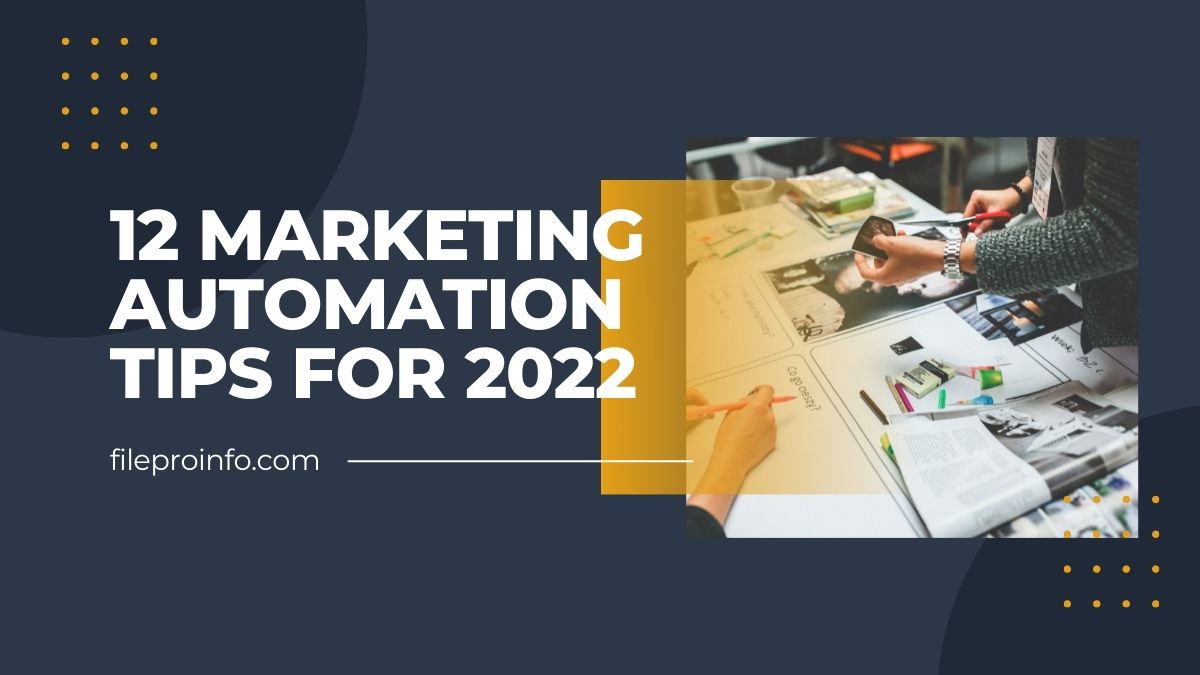
Many businesses are failing to capitalize on technology that has the potential to improve marketing results. They can nurture leads and convert them using marketing automation systems that send thoughtful communications at the right time.
Marketing automation is one of the most effective ways to run a business. It enables you to:
- Make a definition for sending personalized emails to leads and customers.
- Choose from thousands of templates to find the one that works best for your company.
- Automatically follow up with your prospects and nurture them until they become customers.
- You can easily manage your entire list of subscribers from a single location.
The key is to start using it right away and avoid the majority of marketing blunders. Here are 12 pointers to get you started.
1. Create a Strategy for Marketing Automation
Marketing automation has numerous advantages, but you must proceed with caution. Don’t try to automate every aspect of your business right away; not all of your processes are ready for automation right away.
Make a plan. Make certain that you have a strategy in place. Consider the following:
- How will I assess the efficacy of my marketing automation?
- What metrics will I use to evaluate my success?
- What do I hope to accomplish with marketing automation?
Spend some time writing down your goals and objectives. Then, consider what activities you want to automate, the tools you have at your disposal, and how you want to get started.
2. Gradually implement marketing automation
Getting started with marketing automation can be daunting for any company, particularly those unfamiliar with the technology. While some businesses rush into marketing automation, sending out dozens of emails or publishing dozens of social media posts right away, it may be best to take a slower approach.
Choosing how — and how quickly — to integrate marketing automation is dependent on the size of your company, available resources, and the tools you’re using.
The first step is to figure out how you and your coworkers spend your time. Next, determine which tasks take the most time but do not necessarily move prospects through the sales cycle. Many of these tasks can be handled by marketing automation, freeing you up to focus on working with your best prospects and closing deals.
3. Begin with Email Marketing
One of the most important business processes to automate is email marketing. It’s also one of the simplest to implement, so you should start here. Sending emails to your newsletter subscribers, for example, can be time-consuming. Instead, by automating, you can schedule emails to go out ahead of time and have them sent at the specified time without touching them again.
Setting up autoresponders for new leads and customers is another excellent way to automate your business processes. For example, you will be able to send automated messages to people who sign up for your mailing list using this feature.
4. Consolidate Your Social Media Presence
Social media is a highly effective marketing channel, but it takes time and effort to see results. Fortunately, automation can help you streamline many of the daily tasks that marketers perform on these platforms, allowing you to work more efficiently and achieve better results.
The key is to prioritize tasks that can be automated so that you can devote your time to those that require human intervention. As an example:
- Posting Content: Almost every social platform allows you to schedule your posts in advance. Furthermore, many provide native scheduling capabilities built directly into their interface.
- Channel Monitoring: Marketing automation can assist you in tracking key metrics such as follower growth over time.
- Link Tracking: By creating unique links for each piece of content, you can track where your leads come from and how they interact with your site.
There are numerous social media management tools that allow you to schedule posts in advance across multiple accounts at the same time. This means you can spend a few hours (or even just one session) at the start of the week creating all of your posts for the next few days or weeks.
5. Create a List
A list is a powerful tool for reaching out to your target audience and driving business growth. Marketing automation can assist you in organically growing your list without being too pushy about it.
Automation, in particular, enables you to send emails with the appropriate content and messaging at the appropriate time. You can also schedule emails for times when your audience is most likely to be receptive, allowing them to make their own decisions.
6. Automate the Creation of Relevant Content for Your Market
The more relevant your content is, the more likely it will be interacted with. And if they interact with it, it means they’re interested in what you’re saying, which leads to more leads and conversions.
Marketing automation can track how people interact with your content, such as the number of times they click on a link, open an email, or fill out a form. This information can then be used to improve future communications.
The information gleaned from automated tracking can be used to supplement your real-time web analytics. This allows you to see which parts of your website are performing well and which need to be improved.
7. Develop Sales Leads
It is possible to nurture sales leads with specific content, assisting prospects in moving through the sales funnel and closer to a sale. Marketing automation enables you to convert leads into customers by leveraging the power of your content, landing pages, and social media.
Marketing automation enables you to expand your business without adding more people or hours to your sales and marketing teams. It’s also one of the few tools that can be used for both inbound and outbound marketing, giving you the flexibility you require.
8. Make the Customer Experience More Personal
Personalization is essential in any customer-facing business. It should be the focus of your customer experience. Brands that understand their customers’ needs, preferences, and interests are more likely to elicit positive responses from them. However, while it is highly desirable in theory, it can be difficult to implement on your own.
By automatically collecting and managing data at scale, marketing automation enables you to cater to the customer experience. This improves your customers’ experiences, making it easier to retain and keep them happy.
9. Follow up with customers after they make a purchase
Customer retention is one of the most important aspects of growing a sustainable business, and the best way to keep them coming back is to provide excellent service. But, do you follow up with them after they make a purchase? If you do not, you may be passing up a significant opportunity to grow your business.
Marketing automation, it turns out, is one of the best ways to accomplish this. You can use it to create campaigns that check-in with customers who have purchased from your company. These post-purchase emails enable you to send personalized messages at the optimal time to increase revenue and strengthen relationships.
10. Marketing Campaign Reports and Website Traffic
Analytics are critical for any company looking to improve the performance of its marketing and sales teams. A comprehensive marketing automation platform that can track your customers’ activity across all channels is one of the best ways to collect data about them.
These platforms may be able to generate reports on website traffic, sales leads, and conversions from downloads as well as social media posts automatically. Analytics can also be used to track the effectiveness of your sales emails.
11. Don’t Make It Known That You’re Using It Automation
Automation is a tremendously powerful tool for marketers, but it can also be dangerous and reduce engagement if used incorrectly. It’s critical to remember that your subscribers are actual people with real feelings. You must address them as if they were people.
If you make it clear that you’re using automation, you risk alienating your subscribers. They may not feel as if you are treating them as individuals, and as a result, they are less likely to engage with your campaigns or purchase from you again. Personalized subject lines, on the other hand, can go a long way toward increasing open and click-through rates (CTR).
12. Align Automation with Your Overarching Business Objectives
To maximize your return on investment (ROI), you must align automation with your overall business objectives. This means outlining what your company does and what it hopes to achieve as a whole, then breaking that down for each department. After that, you can begin designing your automation strategy to achieve the desired results.
This is not a panacea that will solve all of your marketing and sales issues. However, when properly implemented, it will help you streamline processes, generate more leads, and drive more revenue.
Hopefully, we’ve inspired you to think about how you can use marketing automation to your advantage. Make the mistake of believing that there is a one-size-fits-all solution because there isn’t. Instead, by considering what marketing automation can do for you and your needs, you can figure out how to incorporate it and maximize your ROI.
Learn more from Marketing and read Avoid These 8 Marketing Mistakes At All Costs.




